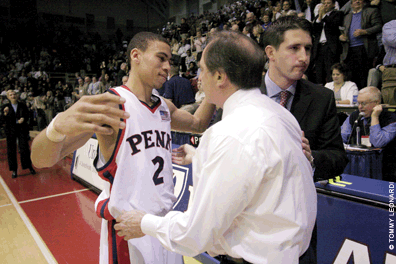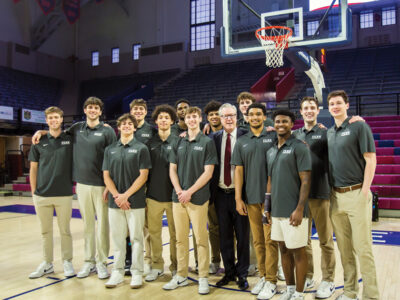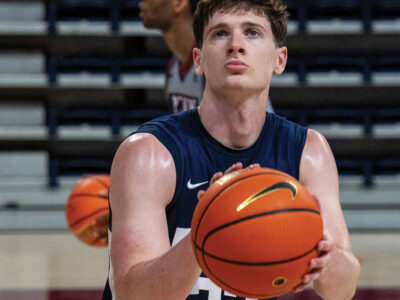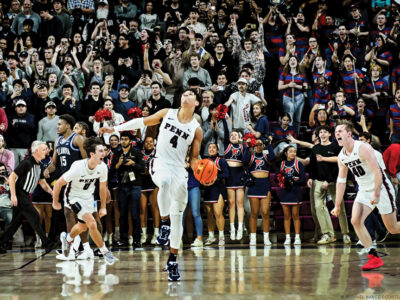
Ibrahim Jaaber and Fran Dunphy embrace on the night of the Quakers’ 76-74 victory over their former coach.
By David Porter | It is a well-established tradition in college basketball to honor a team’s senior players by featuring them on the cover of the annual media guide, which is the only logical reason Brian Grandieri graces the back cover of this year’s edition of the Penn guide while teammates Ibrahim Jaaber, Mark Zoller, and Steve Danley are out front. If ever a player merited a break from tradition to join his peers it is the junior from Media, Pennsylvania, whose sweet shooting stroke and hard-nosed play helped the Quakers to win one of the more memorable games at the Palestra in recent years and break well from the gate as the Ivy League season got under way.
Through the first 20 games of the season, Grandieri was third on the team in scoring behind Zoller and Jaaber at 13.4 points per game, or more than double his average of a year ago when he was used primarily off the bench. He was also shooting 54 percent on 3-point shots, the best mark on the team.
In an opening Ivy weekend in which the Quakers flexed their collective muscles, Grandieri missed his career high by one point with 18 against Cornell, then scored 14 against Columbia—which had defeated Princeton a night earlier and was entertaining thoughts of an improbable home sweep of the Ivies’ two heavyweights—in a 69-43 rout.
It was Jaaber’s turn to turn it on against Temple in a pulsating 76-74 win on January 24 in what will be remembered by all 6,103 in attendance—even the Temple fans, one assumes—as one of the great moments in Big 5 basketball. So much was written in the days leading up to Fran Dunphy’s return to the Palestra to face the school he led to 310 wins and 10 Ivy titles that Dunphy himself, ever the low-key sort, had to succumb to some of the hero worship. “I understand it, even though I disapprove of the way things took shape,” he said in reference to all the pre-game hype, but he was visibly moved by the standing ovation he received when he walked onto the court before the game.
“It felt great. Absolutely great,” he said later. “This would have been a great win to have, but our day will come.”
Jaaber was spectacular in stretches, particularly at the end of the first half when Penn scored 14 consecutive points in the final four minutes to make a 19-point deficit more manageable. Grandieri made his mark in the final, hectic minutes of the game, rising above the defense to hit a jumper in the lane to bring Penn within six points, then calmly knocking down two free throws with 45 seconds left to cut the deficit to one.
Zoller later acknowledged he was anything but calm when he made the decisive foul shots with 1.4 seconds left after being fouled on a 3-point attempt, but they found the twine and sent thousands of Quaker fans onto the court in celebration.
The win was not the first for Penn coach Glen Miller over Dunphy—Miller’s Brown teams beat the Quakers once in 2001 and twice in 2004—but it may have been the most significant, though Miller would not admit as much after the game. “I’ve coached against Fran Dunphy for seven or eight years now,” he said. “This was a difficult situation for him, to come into this building and play against players he recruited and coached. He’s a terrific person and a terrific coach, and my heart goes out to him.”
The players, too, did their best to downplay the drama, though Zoller had admitted earlier in the week that facing Dunphy would be like “playing against your father.” Jaaber summed up the Quakers’ approach, saying, “We’re mature enough to get over the hype, and we came together and did that.”
Penn could have used the clutch foul shooting it displayed against Temple when it traveled to New Haven 10 days later. In what has become practically an annual ritual for the Quakers at Lee Amphitheater, they encountered a Yale team revved up for the occasion and quickly found themselves trailing and struggling to get back in the game. Missing 13 of 21 foul shots made that nearly impossible, and the 77-68 loss dropped Penn into second place behind the surging Elis. With Princeton losing its first four Ivy games in what has to be an ominous sign for the coaching tenure of Joe Scott, the rematch with Yale on March 2 at the Palestra loomed as the biggest hurdle for the Quakers.
The Yale game also highlighted one of the challenges facing Miller as he makes the transition from coaching one of the Ivy League’s perennial also-rans to one of its two elite teams: while he is no stranger to the rigors of the Ivies’ back-to-back scheduling, he is making his first tour through the league with the team everyone wants to beat. One of his tactics has been to spread the playing minutes around: nine players were averaging at least 10 minutes per game, reflecting a change from Dunphy’s habit of employing a shorter bench. Resting the starters hadn’t affected scoring production; in fact, with two-thirds of the season completed, Penn had not been held below 60 points in any game, something no Quaker team has ever accomplished over the course of an entire season.
David Porter C’82 writes for the Associated Press.




